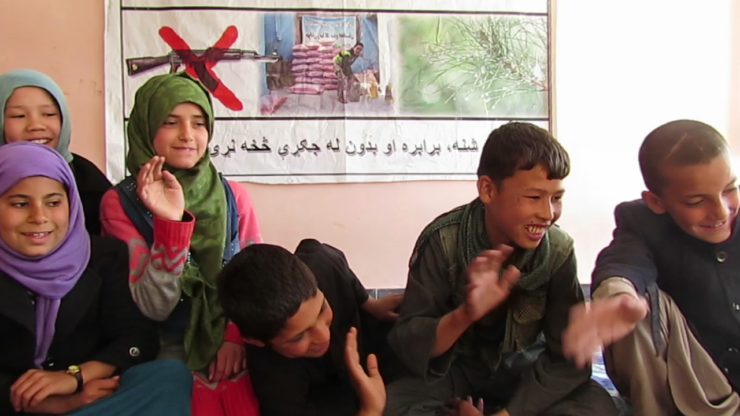You can view a one minute video clip of a conversation between Afghan street kids and Indian 5th graders above: From Afghanistan, children and youth learn through relationships
9th July 2017
By Dr Hakim
Both the panicky rich and the fearful poor are unhappy.
We walk the streets,
and whether they’re speck-less or lined with grimy dust,
we feel a pollution of anger, sadness and helplessness.
We’re invaded by heavy feelings which need new words;
“I’m tired,” my mother says,
about our souls and societies that need healing.
As seen here in Kabul,
Afghanistan has the most number of drug addicts in the world, an estimated 1.6 million
I feel so overwhelmed by the gap
between what humans wish to be and who we’ve become
that I just focus on managing my individual day well.
This isolation shifts when I see that,
by natural inter-dependence,
for me to have a ‘good individual day’,
other human beings should also have decent days.
Their well-being is connected to mine.
Inham, 11-years-old, washing cars to earn extra income for his family
Inham, working in the streets since 8 years of age,
eased me into the drug addiction crisis;
he personalized it
without needing to explain it.
His father is an opium addict,
but Inham doesn’t judge him.
How can we call such an economic system ‘good’,
when Inham works and lives in poverty,
and his father had tried drugs
to placate the desperation of making ends meet?
I asked Inham if he felt happy or sad most of the time.
“Sad.”
An Afghan labourer with no work
There’s no viable employment in Afghanistan,
except with the military and the police.
There are more fancy cars for the rich
and more wedding halls that lure the pseudo-rich and the not-rich
to take up loans for a face-saving ceremony.
There’s also more inequality,
civilian and military deaths and corruption,
and disappearing water
and less trees.
A Relational Learning Circle.
From left to right: Bismillah, Qasim and Nawid in Kabul,
Sofia ( Italian ), Paulina ( Mexican ), Iker (Spanish), Hoor ( Afghan ) in United World College Italy
Then, I saw how the Afghan Peace Volunteers
began connecting the dots
of inequality, war, climate change and other issues,
each time they conversed with one another online,
in what has developed further into Relational Learning Circles.
My heart was churning with excitement
when a Syrian, an Armenian, a Peruvian and a Nigerian
spoke with Maryam, Qasim, Nawid and Nasir.
“Can we abolish inter-state war. If not, why? If yes, how?”
I saw a revolution:
Seven out of eight said,
“Yes, we can abolish war.
It will take time.
We can do it together.”
Five Afghan Street Kids spoke with five Indian 5th graders about war and ‘terrorism’
The Indian 5th graders had good questions for the Afghan street kids
I saw the ‘positive sparks’ fly,
when five 5th grade class students in India
conversed with five Afghan street kids.
“How do you think the government can end the war in Afghanistan?” Delhi asked.
11 year old Sabrullah was like a sage of Kabul,
“If the government wants the war to end,
guns should not be used
and should be banned in Afghanistan,
and in their place, we should have pens and books.”
They said goodbye and the Indian students
thanked their new Afghan friends in Dari they just learnt,
“Tashakur!”
Inham observing the conversation, and learning too
Inham growing up in the digital age
Inham was observing the Kabul-Delhi conversation,
processing what he was hearing as kids and adults do among peers.
I asked him if he was open to speak with friends in New York,
showing him the ‘distance’ on a map.
He understood the time zone difference, then,
said “Okay.”
Once, I saw him playing with another kid’s imitation smart phone;
our instincts of “I want to be happy”,
“I hope to fit in” and “I need friends”
are seeking personal ways
in the maze of today’s ‘disconnect’.
Inham, drawing for fun, before his street kids’ class
Poverty, the risk of sudden death,
water wells drying up,
an un-affirming space in school,
“I have headaches…” –
all these find a tough prey in Inham.
On days when we feel like we can’t do anything,
we know we can do this:
We can calm down and relate differently.
We can reach out for the welfare of others.
I can encourage Inham.










